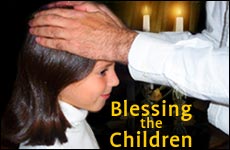The Lord bless you and keep you;
the Lord make his face to shine upon you, and be gracious to you;
the Lord lift up his countenance upon you, and give you peace. [Numbers 6:24-26, NRSV]
[L] Icon – Christ blessing children. [M & R] Blessing children before school.
At MPH Bookstore in Singapore recently, this title by Rolf Garborg captured our interest – The Family Blessing: One Single Act That Will Dramatically Change Your Family‘s Future. We knew that it must be a book on the famous blessing in chapter 6 of the Book of Numbers. This is a prayer we use in one of the talks at our seminar for couples.
Long before we went to Louvain to study theology, we were already impressed by Archbishop Peter Chung (now emeritus) of Kuching who told Catholic parents to bless their children every evening before bed. That was some thirty years ago. Only priests blessed people then. Today, of course, you have Pope Francis who asked the people to bless him and pray for him the moment he was elected to the papacy.
Those familiar words in the biblical blessing formula bring comfort, reassurance and peace as if covering you with the arms of a loving parent. To invoke the name of the Lord is the same as calling upon the power of God. The person blessing, coupled with the blessing itself, mediate the presence and power of God.
To be sure, this blessing is borrowed from the ancient Hebrews from a different context and of a different intent. This blessing text is located in the middle of a major section of Numbers (1:1-10:10) which describes Israel’s preparations for leaving Mt. Sinai (where the people have been camped for almost a year) and the continuation of its journey through the wilderness to the land of promise. And so, originally designed for Israel’s time of departure from Sinai, this Biblical blessing was to be used daily throughout their journey. This is a blessing for a journey!
- Putting God’s name on the people emphasizes the divine source of all blessings.
- In Numbers 6:24 to “keep” is a specific blessing given to those with concerns for safety, focusing on God’s sheltering the people from evil and its effects, especially pertinent for wilderness wandering. The verb “keep” occurs six times in Psalm 121 and covers a wide range of life’s journey. As we use it today in a Christian context, the blessing calls upon God to bless and keep the child that we bless. By “blessing” we mean the fulfillment of God’s covenantal promise to bring abundant goodness to the one we bless. By keeping, we mean God saving the child from evil, and protecting him or her from any force that would weaken the covenant promises.
- In 6:25, God’s “face” or “countenance” (the same Hebrew word is used twice) is a common anthropomorphism that we see a great deal of in the Psalms (see Psalm 4:6; 31:16; 44:3; 67:1; 80:3; 89:15). At the same time, the reference to “shining” uses elements of light and brightness from the nonhuman world, suggesting that darkness is not far away. It reminds us that the nonhuman world, too, illumines the basic character of God (see, e.g., Psalm 36:6). As we use it today in a Christian context, the blessing calls upon God to show Divine face and graciousness to the child. Showing God’s “face” means to find favour with the child, to be present to the child; God’s graciousness means God’s loving activity, in close connection to the covenant. In common idiom, we are asking God to “smile” on the child we are blessing.
- In 6:26, the blessing is repeated and intensified, signifying a gracious movement of God towards humanity, and culminating in the fruitful end game of all Hebrew blessings, which is peace or “shalom”. Shalom is the wondrous sense of God’s presence and peaceful dominion over the cosmos. Both words are actually interchangeable since both refer to the presence and activity of God for the faithful. The richness of the term “shalom” includes a wide range of meaning including prosperity (Psalm 37:11; Proverbs 3:2), longevity and happiness in a family (Psalm 128:6), safety and security (Psalm 4:9; 122:6-8), good health (Psalm 38:4), friendship (Jeremiah 38:22), and general well-being. As we use it today in a Christian context, the blessing embodies the same sense that Paul uses repetitively in his opening greetings in his many letters, that is “grace and peace”.
Parents have a key role in helping their children develop a relationship with the Lord. In blessing their children daily, parents will leave a lasting impact on their lives. When they incorporate the simple Biblical practice of speaking a blessing on someone’s life, parents are reminding their children that they are loved by not only their parents but also by God. When adults bless children not even their own, their blessings inspire others to speak a gracious and encouraging word to those around them.
With all the things surrounding our children in modern living, we need to be praying over them daily. As Rolf Garborg wrote in the book:
- “The single most important concern we should have as parents should be the same primary concern Jesus has for us: We must make it our ultimate goal to help our children know and love God with all their hearts. How do we do that? One of the simplest and most powerful ways…is to give them a daily, concrete encounter with His power and favor by laying hands on them and speaking a blessing.”
Your Children Love to be Blessed by You
The family-blessing is an excellent way of impacting your children with words of grace and blessing.
We should not be, but we always are pleasantly surprised whenever a past participant at one of our seminar for couples tells us that she has had surprising results after adopting our advice to bless her children before bed every night and before they leave for school each morning. When a young mother began the practice of blessing her children, her eldest son was in his early teens and the boy felt shy and ambivalent, while the younger children at once received the blessing with great delight. She persisted all the same with all her children. One morning, just a few months after she started this domestic blessing ritual, the eldest boy dashed out of the house to catch the school bus that was waiting outside. This mother could not believe her eyes when a few seconds later, the son ran back into the house and said urgently to her, “Mom, you have not blessed me yet.” That mother was clearly delighted beyond words when she related the incident to us, thanking us profusely for suggesting the practice of family blessing. She knew with a mother’s instinct that not only would the blessing do immense good for the boy, but that it would leave an overwhelming impression on him as a child. It certainly contributed towards a closer bonding of the mother and child.
Create a Legacy of Blessing
You can create a legacy of blessing.
There is an added beauty in what we are here dealing with: you can create a legacy of blessing.
Kizito is a Dutch lady we met at an International Marriage Encounter Weekend in the early 90s. She and her husband were one of the presenting couples. After the weekend event at Grimbergen Abbey, Belgium, we formed a love-circle which met regularly for reflection, sharing and fellowship, usually on an evening, and always at Kizito’s house. During one of those meetings, as it was getting late, Kizito’s mother who lived with her was getting ready to retire upstairs with the grandchildren. And then, we saw what has become the most beautiful and unforgettable scene of family life we have ever been privileged to witness. At the foot of the stairs, Kizito’s mother, then in her seventies, blessed Kizito, then in her forties with a few children of her own, and signed the cross on Kizito’s forehead. She told us that her mother has been blessing her every night since she was a little girl. She, in turn, blesses here children, every one of them. And the legacy continues.
Not only did this family blessing create a legacy in Kizito’s case, it has contributed to this marvelous and enduring bonding in the family that was clearly evident.
Copyright © Dr. Jeffrey & Angie Goh, August 2014. All rights reserved.
You are most welcome to respond to this post. Email your comments to jeffangiegoh@gmail.com. You can also be dialogue partners in this Ephphatha Coffee-Corner Ministry by sending us questions for discussion.


